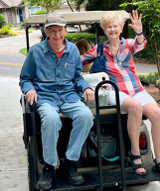Silent Grief of a Non-Grandparent:
Why holidays can be tough times
“A grandparent will help you with your buttons, your zippers and your shoelaces and not be in any hurry for you to grow up” Erma Bombeck
The American Association of Retired Persons (AARP) reports that there are 70 million grandparents in the United States today; the average age of a first-time grandparent is 50 years old (David, P. & Nelson-Kakulla, B., 2019).
However, some people who deeply desire to be a grandparent don’t reach this life milestone. When I became one of these people, I learned that there is no word to describe us. So I coined the term “non-grandparent.”
In 2014, I was elated as I awaited the arrival of my first grandchild. When my daughter and her husband experienced a pregnancy loss after infertility treatments, their dreams were shattered. I too experienced profound sorrow. However, I kept my feelings to myself so I could support them. Over time, keeping silent about my feelings started to take a toll. It was especially difficult for me when other family, friends, neighbors and co-workers talked on and on about their grandchildren or posted pictures about their family activities including grandchildren on social media. I thought I was going to be part of “the grandparents club.” Instead, I was taken down a grief path I was unprepared for.
I kept silent about my sorrow for a long while. I did this because I knew that others close to me were also going through challenging times. Some were getting serious medical diagnoses, losing long-term jobs due to downsizing, learning their child was separating from their spouse, and more. I thought my feelings paled in comparison. Through trial and error, I learned how to talk to others who are close to me about how I felt. I quickly learned that they wanted to support me and did not think my feelings were trivial.
I was a non-grandparent for four years. Our family was blessed last summer when our daughter and son-in-law adopted our granddaughter! Nonetheless, my experience as a non-grandparent remains vivid in my memory.
My longing to be a grandparent was not based upon dictionary definitions about who a grandparent is. Published definitions of the term grandparent are strictly biological. I desired to actively engage with a grandchild/grandchildren physically, emotionally and spiritually. I did some reading about published surveys with grandparents as participants and found that my yearning was actually what contemporary grandparents say they do with a grandchild!
In 2013, editors of Grandparents.com conducted an internal survey to their members and published Surprising Facts About Grandparents: We reveal how today’s grandparents are defying stereotypes. (Accessed from: https://considerable.com/surprising-facts-about-g...) I was amazed that well over 1.5 million in the United States become new grandparents each year (1.7 million people). In 2013, the average age of a first-time grandparent cited by the Grandparents.com editors was age 48; five years later, a survey conducted by AARP in 2018 reveals the average age of a first time grandparent has now risen by 2 years, to age 50. (David, P. & Nelson-Kakulla, B., 2019).
Overall, the Grandparents.com survey results found that of grandparents:
72% think being a grandparent is the single most important and satisfying thing in their life
63% say they can do a better job caring for grandchildren than they did with their own
68% think being a grandparent brings them closer to their adult children
90% enjoy talking about their grandkids to just about everyone
The Grandparents.com editors also delved deeper into “spending time with grandchildren” and found these facts:
60% live close to their grandchildren
46% wish they could live even closer
70% see the kids at least once a week
66% travel with their grandkids
81% have their grandkids for part or all of their summer vacation
I re-read these facts several times. To me, these statistics confirm how vital the active role of grandparenting is and validated my sorrow at being a non-grandparent. For several years, I believed that being a grandparent would be extremely enriching to me at this time in my life. I dreamed of being actively involved with my grandchildren. Maybe many readers can identify with similar feelings, no matter what circumstance has led you to be a non-grandparent.
People can be non-grandparents for a variety of reasons. These include non-childbearing causes, such as when an adult child decides to remain childless or postpones having children indefinitely due to career or educational pursuits. There are also childbearing causes, such as when an adult child faces infertility and/or pregnancy loss or has a child die. Some are not able to enjoy being grandparents because ties to an adult child are limited or completely broken, restricting contact partially, or totally, to a grandchild.
There is data available for the childbearing causes of being a non-grandparent. The Centers for Disease Control and Prevention (CDC) reports that approximately 6% of married women aged 15 to 44 (1.5 million) are unable to get pregnant after one year of trying; 12% of all women aged 15 to 44 have difficulty getting pregnant or carrying a pregnancy to term, regardless of marital status and 20,000 stillbirths occur annually (CDC, 2019).
Approximately 9% of men aged 15 through 44 faced infertility or non-surgical sterility from 2006 to 2010 (CDC, 2019). Additionally, an estimated 10 to 15% of pregnancies end in miscarriage (March of Dimes, 2017). These statistics validate that a tremendous number of people have an adult child with infertility and/or a history of pregnancy loss. You may now realize that you know a non-grandparent or two.
I believe there are many, many non-grandparents among us. I also believe that most non-
grandparents keep their sorrow a secret. They need to know they are not alone in their journey
and that their grief is justified. A quote by John Steinbeck resonates with me: “Nearly everyone
has his box of secret pain, shared with no one” (East of Eden, 1952).
The holiday season can be difficult for a non-grandparent. Families and friends gather together, and oftentimes grandchildren are present. Social media abounds with pictures of festive family activities with grandchildren. Publicly, grandparents and grandchildren are seen enjoying each other’s company at movie theaters, shopping malls and restaurants. The list goes on. These situations can be tough for a non-grandparent who, like myself for so long, desired to be part of “the grandparents club” during the year, and particularly during the holiday season.
Bring up the elephant in the room and talk to the non-grandparents you know and love about what you read in this article. Let them know that you are there for them whenever they want to talk about their feelings.
If you can’t find the words, simply hug a non-grandparent this holiday season. A hug speaks volumes.
Mary Ellen Miller PhD, RN, APHN-BC
Director, Bridging the Gaps Community Health Internship Lehigh Valley Affiliate
Email: nursemaryellen1977@gmail.com
References:
Centers for Disease Control and Prevention (2019). Reproductive Health: Infertility FAQ’s. (Accessed from: https://www.cdc.gov/reproductivehealth/infertilit...)
David, P. & Nelson-Kakulla, B. 2018 Grandparents Today National Survey: General Population Report. Washington, DC: AARP Research, April 2019. https://doi.org/10.26419/res.00289.001)
Grandparents.com Surprising Facts About Grandparents: We reveal how today’s grandparents are defying stereotypes. (Accessed from: https://considerable.com/surprising-facts-about-g...)
March of Dimes (2017). Miscarriage: Key Points. (Accessed from: https://www.marchofdimes.org/complications/miscar...)




